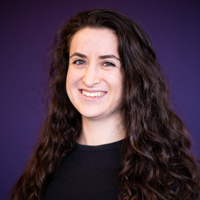Specializations
- Misinformation and judgments of truth
- Social cognition
- Research methodology
Research Areas
Biography
Madeline Jalbert studies how context and subjective experiences influence memory, judgment, and decision-making. Her work primarily focuses on factors that impact judgments of truth and risk, as well as how these judgments play out in naturalistic contexts. The goal of this work is to shed light on effective strategies for preventing and correcting the spread of misinformation.
Madeline comes from a background in social and cognitive psychology. She completed her Ph.D. in Social Psychology under the advisement of Dr. Norbert Schwarz. Prior to this, she worked in the Applied Cognition Research Lab of Dr. Ira Hyman.
Education
- Ph D, Social Psychology, University of Southern California, 2021
- MA, Social Psychology, University of Southern California, 2018
- BS, Behavioral Neuroscience, minor in Chemistry, Western Washington University, 2016
Publications and Contributions
-
Journal Article, Academic JournalOur field was built on decades-old bodies of research across a range of disciplines. It wasn’t invented by a ‘class of misinformation experts’ in 2016. (2024)
-
Magazine/Trade PublicationWhat makes an election rumor go viral? Look at these 10 factors (2022)Nieman Lab
-
Journal Article, Academic JournalMetacognitive experiences as information: Fluency in consumer judgment and decision making (2021)Consumer Psychology Review, 4(1), pp. 4-25
-
Journal Article, Academic JournalNeed for Cognition: Individual differences in truthiness and illusory truth (2020)Consciousness & Cognition, 78(102866)
-
Journal Article, Academic JournalOnly half of what I’ll tell you is true: Expecting to encounter falsehoods reduces illusory truth (2020)Journal of Applied Research in Cognition and Memory, 9, pp. 602-613
-
Book, Chapter in Scholarly Book-NewWhen (fake) news feels true: Intuitions of truth and the acceptance and correction of misinformation (2020)The psychology of fake news: Accepting, sharing, and correcting misinformation
-
Book, Chapter in Scholarly Book-NewCognitive fluency in the courtroom (2019)International Handbook of Legal and Investigative Psychology
-
Journal Article, Academic Journal
-
Journal Article, Academic JournalMisinformation and worldviews in the post-truth information age: Commentary on Lewandowsky, Ecker, and Cook (2017)Journal of Applied Research in Memory and Cognition, 6(4), pp. 377-381
Presentations
-
A lemon in yellow, a lemon in blue: Color congruence and truth judgment
(2021)
Poster to be presented at the annual meeting of the Society for Personality and Social Psychology
-
A lemon in yellow, a lemon in blue: Color congruence and perceived truth
(2020)
Los Angeles, CA
-
When thinking more backfires: Individual differences in Need for Cognition and the illusory truth effect
(2020)
New Orleans, LA
-
Elaboration and Truth: What helps now, hurts later?
(2019)
Quebec, Canada
-
If it’s relatively difficult to pronounce, it must be risky: Risk perception depends on processing experience in context
(2019)
Portland, OR
-
The curious status of pre-exposure warnings in misinformation research
(2019)
Cape Cod, MA
-
Voluntary, involuntary, and intrusive: The role of retrieval mode in intrusive memories
(2019)
Cape Cod, MA
-
Fluency effects on risk perception are driven by the processing experience, not the stimulus
(2018)
New Orleans, LA
-
Only half of what I’ll tell you is true: The role of Need for Cognition in the emergence of the truth effect
(2018)
Atlanta, GA
-
Repetition makes it true: The role of warnings and elaboration
(2018)
Lucerne, Switzerland
-
Only half of what I’ll tell you is true: How experimental procedures lead to an underestimation of the truth effect in the real world
(2017)
Vancouver, Canada
-
Only half of what I’ll tell you is true: How experimental procedures lead to an underestimation of the truth effect in the real world
(2017)
Burnaby, Canada
-
Stealing memories: The egocentric source monitoring bias following collaborative remembering
(2017)
Burnaby, Canada
-
Stealing memories: The egocentric source monitoring bias following collaborative remembering
(2017)
Vancouver, Canada
-
Cognitive load during divided attention leads to intrusive rebound of thoughts
(2015)
Bellingham, WA
-
From involuntary to intrusive: The features that cause a thought to feel intrusive
(2015)
Chicago, IL
-
Recall me maybe: From distractor to intrusive though
(2015)
Victoria, BC
-
Using songs to explore intrusive thoughts
(2015)
Bellingham, WA
-
Don’t stop the music: The effect of thought suppression on songs stuck in one’s head
(2014)
Victoria, BC
-
From distractor to intrusive thought
(2014)
Long Beach, CA

